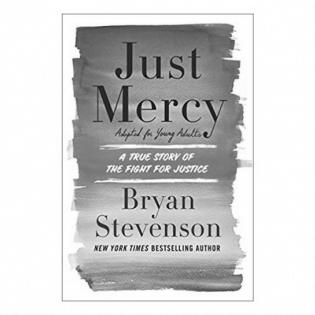Just Mercy Literature Guide
In this true story, Bryan Stevenson fights injustice and champions wrongfully incarcerated Black men on death row with special attention given to the case of Walter McMillian. Stevenson is a lawyer who works to restore basic human rights for vulnerable people, including people who are poor, wrongly accused, and who face ongoing discrimination. His story calls us to action and empathy for justice. This is an adaptation of the original #1 bestseller.
Literature Guide by Kathy Adamonis
Discussion Questions
- Have you ever been accused of something that you didn’t do? What happened? How did it turn out?
- Walter McMillian, a black man, is accused of killing a young, white woman. What do you think might happen to Walter? Why do you predict that is what will happen?
- Have you ever experienced something like this in your community or read about/seen it on the news? How does this injustice impact the community?
- What are some of the issues that you’ve read about that seem unfair? (for example, discrimination against interracial marriage or LGBTQ rights, police brutality, racism, wrongful conviction)
- Do you think Walter will be convicted? Why or why not? Why does the DA insist that Walter committed murder? Will Walter be freed? Why do you think that?
- Think of a time when you were wrongfully accused of something. Why didn’t your accuser believe your version of the story? Were you able to change your accuser’s mind? How did things turn out?
- How did Walter change throughout the story? How did what happened to Walter impact his family and friends?
- Why did Bryan Stevenson persist to free Walter and defend others even with extreme hurdles and personal risk? Why do you think the word mercy is in the title of the book?
- You and your friends can make a difference in your community. What big and small things can you do to make sure that all voices are heard, especially voices of people who are vulnerable? How can you advocate for social justice in your community? What is the personal risk for standing up for others?
Activities
-
Complete the Blue Sky Visioning activity. Follow the directions to draw a picture of your idea of a perfect community or healed issue that you are passionate about. Draw your vision of what change would look like. Share your vision with others. Research more information about an issue that concerns you.
-
Discuss first steps or ideas on how to work toward the visions. What are you passionate about and how can you impact change in your community? For example, if you are passionate about food issues, you might want to start by volunteering at a local food pantry or giving time to a food bank. Small steps matter!
-
Research one of the issues identified in Just Mercy. Become an advocate for change by doing one of the following:
Write letters to the editor of a local newspaper, elected officials, or your school board.
Make posters to share information with your peers and local community.
Give an informational speech and post it on social media.
